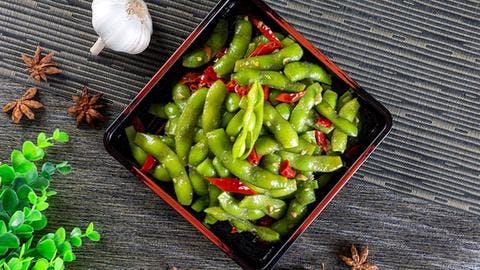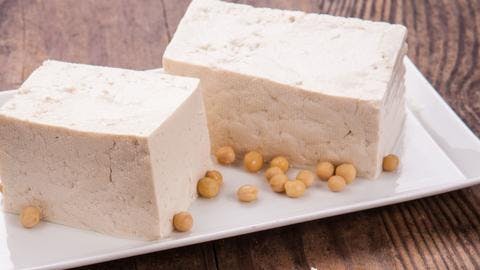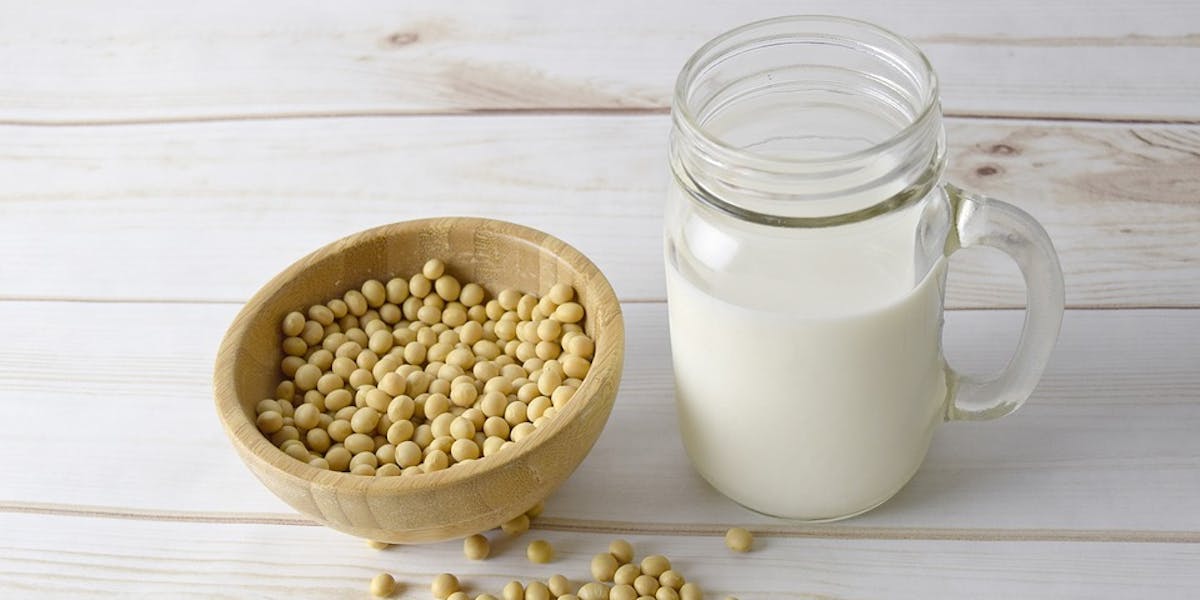Lifestyle
Is Soy Good for Our Health?
12min read
For something as innocuous as a bean, soy gets a pretty bad rap. It's widely blamed for single-handedly destroying the environment as well as ruining the health of those that consume it. We couldn’t help but wonder if this little legume’s reputation is really quite as terrifying as it's made out to be.
In an effort to learn more, we explored the contemporary research (some singing soy’s praises, others vehemently urging consumers to avoid it at all costs) and spoke to our in-house nutritionist. While finding a definitive answer to this question is admittedly tough, a growing body of scientific evidence is certainly turning the tide in soy’s favour.
Here's what we found out:
Is soy bad for my health?
In short: No.
While the main health-related arguments against soy are pretty compelling (it's believed to affect thyroid function and increase oestrogen levels, which — amongst other things — can lead to lower libido, accumulation of fat and reduced fertility); sufficient evidence to either prove or debunk these claims hasn't yet been found.
Here’s what we discovered:
The common narrative on soy generally comes from older, laboratory-based tests and due to the conditions they were carried out in, many of these trials are now widely agreed to be flawed. Some used isolated soy compounds, which don't accurately mimc the effects of soy-based foods (non-representative). Others used rats as test subjects and, as our understanding of the differences between human and rodent digestive systems has developed, there's a growing body of evidence to suggest the two aren't comparable.
So what are the facts?
Will soy increase my oestrogen levels?
In short: No.
Soy contains isoflavones, which are chemically similar to the human hormone oestrogen. These similarities — and the tests mentioned above — led to a belief that eating soy would increase oestrogen levels in humans.
Scientifically, this is now not thought to be the case. In the human body, the effects of isoflavones from soy food products: are far weaker; affect only a few human body tissues; and, in some situations, can even have the opposite effect to oestrogen. Soy is a complex little bean!
Will soy make me infertile?
Again, in short: No.
A 2008 study concluded that, a “higher intake of soy foods and soy isoflavones is associated with lower sperm concentration.”
However, the NHS identified a number of flaws in the validity of the study’s results and concluded that the link between soy and infertility wasn't as clear as was suggested. Fertility is complex and dependent on a myriad factors. Given the limitations of the study, a scientifically significant causal link between soy and low sperm count wasn't found. They suggested that more research on humans should be carried out but that, in the meantime, limiting soy intake for those men who already had a low sperm count could do no harm.
Will soy affect my thyroid?
In short: No.
Despite the common narrative that soy inhibits thyroid function, 14 human trials conducted in 2006 found little or no connection between the two, and these findings were subsequently confirmed by a variety of other studies.
However, there was some evidence that eating soy products may inhibit the absorption of levothyroxine in people who already suffer from hypothyroidism. Interestingly, soy isn't alone in this: a number of other herbs, drugs and supplements do the same. To this end, the studies do not suggest avoiding soy completely as the effects of soy were only found to be significant if taking medication after eating soy-based foods.

Is soy nutritious?
Compared to other legumes, yes, soy has a unique nutritional composition: it's higher in both protein and fat but lower in carbohydrate.
Is soy a good source of protein?
In short: Yes.
Soy directly refutes the common paradox of plant-based foods and protein: it's one of the few plant-based foods that contains all nine essential amino acids. The protein it contains is both high quality and easily digestible — specifically comparable to animal sources.
Is soy a source of healthy fats?
In short: Yes.
Soybeans contain unsaturated fats; the “good” kind. Last year, the World Health Organisation stated that the unsaturated fats found in soy (along with avocado, nuts and other plant oils) are preferable to those derived from processed foods and animal products (with fish being the sole — pun intended — exception to this rule). Win.
Does soy improve cholesterol levels?
In short: Yes.
A large body of research suggests that eating healthy soy products reduces LDL levels (bad cholesterol) while raising HDL (good cholesterol).
What other nutrients does soy contain?
Soy is a great source of: iron, zinc, potassium and calcium, with absorption rates of the latter being comparable to dairy milk. Holy cow.
Are all soy products good for me?
Nutritionally speaking, therefore, soybeans are an incredibly healthy food to include in your diet. Sadly, though, not all soy products are equal; the problems begin to creep in when you consider the different types of foods we choose to eat.
Snacking on boiled edamame beans — or including them in curries, stir fries and salads — is a great way to benefit from soy’s nutritional makeup. Fermented soy products (such as tempeh and miso) are also particularly nutritious. The soy component of many Asian diets is almost solely fermented; this is one of the potential explanations for lower rates of certain diseases (such as specific types of cancer) in these countries. Even tofu is pretty good for us.
However, it's worth checking ingredient lists because some products have added sugars and unnatural sweeteners. Choosing low-sugar or unsweetened soy milks and yoghurts is preferable. Additionally, isolated soy compounds, like soy protein isolate — found in many everyday products as well as textured vegetable proteins, protein powders and nutrition bars — are likely to contain concentrated isoflavones similar to those used in the older laboratory trials.
What are the benefits of including soy in my diet?
Similar to above, there are a number of studies — with varying statistical significance — that suggest soy is more beneficial than destructive to our bodies.
- It's scientifically agreed that soy can decrease the frequency and severity of hot flashes in menopausal women and lower circulating LDL-cholesterol levels.
- There's a significant link between soy consumption and a decrease in risk of cardiovascular disease.
- Due to its high-quality protein and well-absorbed calcium, there's some evidence to show that soy can contribute to bone health.
Studies comparing high-soy consuming countries — often in Asia — with Western countries suggest a link between soy consumption and decreased rates of both breast and prostate cancers but these suggestions aren't widely confirmed yet.

Is soy good for you or not?
Based on the most recent research, we believe that the pros of consuming soy outweigh the cons. So many soy-based foods (like edamame, tofu, tempeh, miso and unsweetened soy milks) are healthy and nutritious to consume as part of a balanced diet unless, of course, you are allergic to soy.
Some soy-related health tips:
- You may want to consume more soy products if you're a woman going through the menopause since it's statistically proven to help decrease the length and severity of your hot flushes.
- Replacing animal fats and proteins with soy-based products is considered to be a healthier way to gain similar nutritional benefits.
- If you're going to include soy products in your meals, do so as part of a healthy, balanced diet. Choose edamame beans, tempeh, tofu, miso and soy milk over foods that list soy, or soy isolates, as an additional ingredient.
- It may be advisable to limit your soy intake if:
- You take levothyroxine, since soy might inhibit your body’s ability to absorb it
- You are suffering from fertility difficulties, since there is a possible link between soy consumption and lower sperm density in those already struggling to conceive
How did we reach our conclusion?
The more we discovered about soy, the more frustrated we got at the lack of definitive answers and the number of under-researched articles out there. Too many argue one side or the other profusely, without a sniff of citation.
At allplants, we are interested in the root of the research. On delving a little further in, we realised that a particular study (Soy and Health Update: Evaluation of the Clinical and Epidemiologic Literature) can be traced back to the Soy Nutrition Institute. This could mean a number of things: from an invested interest in the positive outcome of the study to the simple fact that they have the financial means and intellectual motivation to fund such a study. This is comparable to studies that are heavily pro-animal-products being funded by animal agribusinesses; it is always good to follow the money trail.
While we're not ones to blindly listen to health organisations — and despite the potential questions about the roots of the research — the conclusions of the Soy and Health Update are ratified by the World Health Organisation, the NHS, Dietitians of Canada and a host of other more reputable sources. The Association of UK Dietitians also produced a factsheet in 2017 that goes into more detail on all of the health-related implications of soy, which, again, supports the outcomes of this study: that whole soy foods are a healthy and nutritious part of a balanced diet.
We hold our hands up and admit that we have a vested interest in putting a healthy plant-based diet in a positive light. At allplants, our values and beliefs are based upon what is increasingly being agreed as the best path for both people and the planet. After digesting our research, we believe that soy happens to be a part of that! Feel free to check our sources.
Useful sources
- What Does a Dietitian Do?, www.bda.uk.com/foodfacts/home.
- Chavarro, J. E., et al. “Soy Food and Isoflavone Intake in Relation to Semen Quality Parameters among Men from an Infertility Clinic.” Human Reproduction, vol. 23, no. 11, 2008, pp. 2584–2590., doi:10.1093/humrep/den243.
- “The Comprehensive (and Shocking) Guide To Soy and Thyroid.” Dr. Alan Christianson, 27 July 2018, drchristianson.com/the-comprehensive-and-shocking-guide-to-soy-and-thyroid/.
- “The Dangers of Soy | Paleo Leap.” Paleo Leap | Paleo Diet Recipes & Tips, 4 Nov. 2016, paleoleap.com/dangers-soy/.
- “Dr. Mark Messina, Author at The Soy Nutrition Institute - Page 3 of 6.” The Soy Nutrition Institute, thesoynutritioninstitute.com/author/dr-mark-messina/page/3/.
- Harvard Health Publishing. “Confused about Eating Soy?” Harvard Health Blog, Harvard Health Publishing, www.health.harvard.edu/staying-healthy/confused-about-eating-soy.
- “Healthy Diet.” World Health Organization, World Health Organization, www.who.int/news-room/fact-sheets/detail/healthy-diet.
- Messina, Mark. “Soy and Health Update: Evaluation of the Clinical and Epidemiologic Literature.” Nutrients, vol. 8, no. 12, 2016, p. 754., doi:10.3390/nu8120754.
- Nichols, Hannah. “Estrogen: Functions, Uses, and Imbalances.” Medical News Today, MediLexicon International, 2 Jan. 2018, www.medicalnewstoday.com/articles/277177.php.
- Patisaul, Heather B., and Wendy Jefferson. “The Pros and Cons of Phytoestrogens.” Frontiers in Neuroendocrinology, vol. 31, no. 4, 2010, pp. 400–419., doi:10.1016/j.yfrne.2010.03.003.
- “The Scoop on Soy.” What Is a Dietitian? - Unlock Food, www.unlockfood.ca/en/Articles/Vegetarian-and-Vegan-Diets/The-Scoop-on-Soy.aspx.
By Munjeeta Sohal
MJ is a freelance writer, avid reader and habitual ruminator (and user of fancy words). She couldn’t live without books and her cats. On her days off, you can find her cycling up and down the Lea Valley, searching for a great vegan recipe to cook, or, well, reading her book with her cats.
Let us take care of dinner
We help to make eating more plants easy and delicious. Fancy letting us take care of dinner? Check out our delicious meals here.
Shop now
